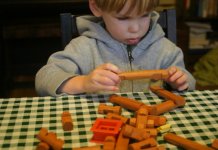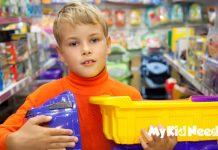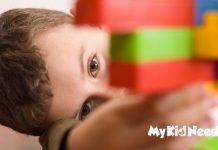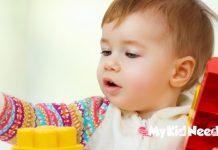Choosing the perfect gifts for our young boys can be quite challenging. Sometimes, even if we already think we understand the personal characteristics that make our sons very unique, we still end up with largely-inappropriate toys and gifts. While there are no clear-cut rules or blueprints to finding the perfect presents for the ones we hold dear in our lives, there are some things we can do to help simply the process of selecting the correct and most appropriate presents for them.
General Considerations when Choosing a Gift for Boys
We did say that there are no blueprints to the effective selection of presents for the young male in your family. However, there are definitely some things we can observe or even consider every time we head to a department store or even shop online for the perfect gift for our sons. Here are two of the most common factors that you should always consider when on the lookout for anything that resembles like a gift or a present for your child, more specifically your son or any other male child.
Developmental Appropriateness
Many call it the age-appropriateness of toys; but, we prefer to call it developmental appropriateness. While the terms are often used interchangeably, there’s a very unique difference between the two; albeit often indistinguishable. When we say age-appropriate, we’re technically referring to the characteristics of a certain toy or gift relative to the age of a child. That’s why you will see most products coming with a recommendation on the age of the child that will be using such toys or gifts. For instance, you may see a print on the label that says “For Children Aged 3+”.
This means that the toy or gift is intended for children who are at least 3 years old and as such should not be given to children younger than the recommended age. It’s pretty simple and very straightforward, actually. You don’t have to second guess about the appropriateness of the toy to your child. As long as your kid falls within the recommended age, then it should be perfectly alright. Well, almost.
You see, it is also very possible that, even though a child is well within the recommended age range of the product, his developmental skills are either below or above that of the required skills necessary to play and enjoy the product. For example, a 12-month old child can already be expected to pull himself to stand without support. Unfortunately, not ALL 12-month olds can do that. Some can perform this task much earlier at 9 to 10 months; some later at 14 to 15 months. What if you bought a gift or a toy that calls for the child to be firmly standing up and your child, while he is already 12 months old, is still not able to accomplish this task, what then?
This is where a child’s developmental level comes in. And this is what we refer to as the developmental appropriateness of toys or gifts. Instead of relying only on the chronological age of the child, it makes more sense to look at the developmental level of your child and compare this with what the product calls for. It is very important to recognize the relationship between what your child is able to perform for his age and what kind of action or skill the toy or product requires. There must be congruence between the two; otherwise, you end up with a very frustrated young boy (in case his developmental level is well below what the toy requires making it quite difficult to play with) or a very bored son (in case his developmental level is too advanced for what the product requires making it too easy for him). Either way, you end up with an utterly useless gift and one that many would consider a waste of money.
While developmental appropriateness is a must for any toy, we have to acknowledge the fact that it is very tedious to be learning about all the developmental skills of any given child and compare these to what your son has. That is why, as a matter of convenience, many would still go for age-appropriateness as an indicator of the correctness of the toy or gift for any young boy. We just would like to add that due diligence be exercised in choosing age-appropriate toys. When a product has been selected, we need to ask ourselves if our child can really benefit from it.
Safety
One in three children’s toys contain toxic and harmful chemicals. This is the result of a finding conducted in 2009, evaluating no less than 4,000 kids’ products for the toxic substances that they contain. Even very popular toys for young boys contain toxic chemicals. But there is good news in the said report. The percentage of kiddie products that contain these harmful substances is on the decline. While there are still companies or toy manufacturers that refuse to make significant changes in their manufacturing processes not to use harmful substances, there is a steady growing number of toymakers who put emphasis on child safety in their products. You should be glad to learn that some Chinese toy manufacturers are now instituting significant improvements in their manufacturing processes, substantially eliminating the need for the inclusion of toxic chemicals in their products.
But just what are these toxic substances commonly found in toys and kiddie items that you need to be wary about? Here are some of them.
• Lead – A well-known neurotoxic substance which is harmful to many organs and body systems mostly affecting very young children like neonates, newborns, and toddlers. The maximum amount of lead that can be tolerated by young children, according to the American Academy of Pediatrics, is 40 parts per million. Unfortunately, 7 of 10 kiddie products still contain lead greater than 40 ppm.
• Cadmium – Can cause cancer, softening of the bones, kidney problems, and failure of optimum brain development in babies and children.
• Phthalates – While there is no direct clinical evidence to establish its negative effects on humans, phthalates in animal studies have been shown to be highly toxic to the reproductive system, the liver, heart and lungs, and the kidneys. It has also been shown to have an adverse effect on the overall development of the organism. Other studies found that human mothers, who were exposed to phthalates while they were still pregnant, gave birth to boys who exhibited a reduction in male-typical play behavior. Phthalates are one of the principal substances included in PVC to soften it as plasticizers.
• Polyvinyl chloride or PVC – This is a very common plastic polymer that can be seen in many products. Its monomer, vinyl chloride, has been linked to liver cancer and a rare type of cancer known as hemangiosarcoma. Other components of PVC like phthalates and bisphenol A.
• Flame retardants that contain bromine – These chemicals are known to adversely affect the development of the nervous system while also disrupting the normal functioning of the thyroid glands. It has also been shown in animal studies that BFRs are toxic to the liver. One type of flame retardant, DecaBDE, is classified by the EPA as a possible cause of cancer.
• Bisphenol A or BPA – This chemical is known for its estrogenic effects whereby boys inherently develop more feminine characteristics such as breast enlargement. In animal studies, BPA is known to cause problems in the overall development of the organism including its nervous and reproductive systems. Studies in epidemiology also established a link between BPA and the development of cardiovascular diseases and diabetes.
Safety is of paramount importance when choosing the perfect gift for your son. Sadly, the chemicals contained in these kiddie items are not only the cause of concern. The integrity of the design of the toy or gift can have an effect on its overall safety as well. Here are other safety considerations in the selection of toys or gifts for your son.
• Toys that have small removable parts can be especially dangerous for very young children especially those who are less than 3 years of age. These are considered as choking hazards. This also includes small balls, balloons, and other toys that are smaller than 1.25 inches wide or 2.25 inches long.
• Clothes and other gift items for kids that have small removable parts or parts that may easily break or fall off like buttons are also choking hazards and as such are deemed inappropriate for very young children. While clothes remain a favorite gift for kids, it is important to look at the quality of its construction.
• Electronic toys may also be a major source of concern especially those that require rechargeable mechanisms. It is important to look for products that have UL-certification or any other equivalent reputable organization. You don’t want these toys, gizmos, or gifts exploding right in your face.
• The overall construction of the gift or toy should also be considered. For example, does it break easily? Do the different parts easily fall apart? Is the finished product sturdy enough to accommodate the weight of your son in case he decides to ride on it?
The developmental appropriateness and safety of a product should always be considered when choosing the perfect gift for your son. We know it is quite tedious to be doing a very exhaustive evaluation into a product’s developmental appropriateness and safety but this will only help ensure that your son will be reaping the full benefits of your gift.
Choosing the Right Gifts for Your Son across Different Age Groups
It is clear that one of the most important considerations when choosing the perfect gift for your son is the product’s developmental appropriateness. As such, it is crucial that we take some time to understand the fundamentals of development as it occurs across the different age groups of children. It should be understood that different age groups will have different developmental needs. Understanding these needs will help us make the correct decision when it comes to selecting which gift to give to our sons.
Infants
Babies are quite easy to understand. Their development essentially centers around two things – sensory and motor development. When they are born, they do not have control of their motor movements yet. Most of these movements are reflexive, a result of the complex nature of the peripheral and central nervous systems interacting. It is thus very important for them to learn to control these movements as they progress through the first year of life. Aiding in the development of their motor skills is their ability to gather information from the environment through the use of their senses. Through the sense of touch, hearing, smell, sight, and taste, babies are able to obtain a variety of information or sensory stimulus which are then fed to the infant brain. These are like the things we input into a computer for it to work and produce outcomes. It is this connection between what the baby is able to obtain from his surroundings and how the body uses this information to move the muscles that highlight the development of your baby boy.
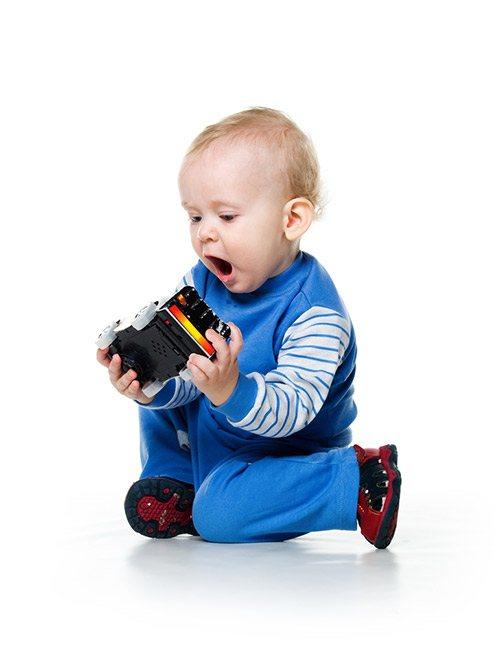 Of course, there are other developmental milestones that infants can achieve. These can include the following.
Of course, there are other developmental milestones that infants can achieve. These can include the following.
• They are socially dependent and are learning to develop trust with their primary caregivers – you and your spouse.
• They begin interacting with faces while also developing rudimentary forms of “talking” such as cooing and babbling.
• They start reaching out to others hoping for a response and will greatly be pleased when they do evoke responses from others.
• They show particular fondness or “baby love” with certain adults like mom or dad.
• They express their feelings through body language like forming a variety of facial expressions or even crying.
• They may express their dissatisfaction over something by crying.
• They are already very unique individuals.
As such, if you have a baby boy, the toys or gifts that will be very appropriate are those that:
• Provide sensory stimulation like visual, tactile, auditory, gustatory, and even olfactory;
• Allow him to touch, manipulate, hold, grasp, pinch, or grab things;
• Encourage him to roll on his tummy, kick, crawl, sit, stand, and walk, as well as other activities that make use of his muscles;
• Respond to the actions of your son;
• Provide for his basic needs such as food, healthcare, clothing, and nurturing; and
• Help him develop trust in you.
Examples of toys and gifts that are appropriate for your baby boy are:
• If he is less than 3 months old – colorful and high contrast mobiles, music boxes, handheld toys, wind chimes, wrist and sock rattles, soft books, sensory toys, and unbreakable mirror;
• If he is between 3 and 6 months old – crib mobiles, activity bars, play gyms, soft embroidered stuffed toys, squeaky rubber toys, board books, teething rings, and toys he can manipulate like puzzles and shape sorters;
• If he is between 6 and 9 months old – toys he can handle and manipulate such as ring cones, nesting cups, and stacking blocks, soft embroidered animals, balls, household items, push toys, and playthings that make noise; and
• If he is between 9 and 12 months old – push toys, shape sorters, books, balls, blocks, toy telephone, and pail and shovel.
Check out our great selection of toys from recommend manufacturers for 1 Year Old boys and 2 Year Old boys.
Toddlers
If there is one very remarkable characteristic of toddlers, that would be their sense of adventure and exploration. By this stage, your son has already learned the full use of his muscles and is now using this to increase his coverage of his surroundings. He is now building on his sensory experiences as a baby and wishes more information for his brain to process. That’s why they are essentially called the little explorers because they now have the basic understanding of the need to gather as much information as possible to learn newer things. Helping them achieve this is their now-stronger motor skills.
If your boy is between 1 and 2 years old, you can expect him to:
• Be very curious, active, playful, and energetic;
• Be always exploring, moving, and seeking stimulation;
• Start developing his language;
• Begin attaching parents and special people to his special toys as well as objects;
• Have a rapidly advancing set of motor skills;
• Understand the meaning of some words which enables him to communicate with others through sounds and gestures;
• Show interest in his peers; and
• Show little to no understanding of limits.
If your young boy is between 2 and 3 years old, the following are his major characteristics.
• Very egocentric and self-absorbed;
• Shows mastery of his physical skills including balance and coordination;
• Very curious, loves exploration and discovery;
• Invents syntax, very verbal, and is fast learning new words;
• May show resistance to the authority of others;
• May show acceptance of limits, but only sometimes;
• His favorite words are me, mine, and my; and
• May use symbols during playtime.
Based on these characteristics, the best kinds of gifts or toys that you can give to your son who is already a toddler may include the following:
• Toys that allow him to continue developing and improving his gross and fine motor skills;
• Gifts that allow him to explore and show off his skills as a means of obtaining praise and respect from others;
• Playthings that can provide him with a sense of security as well as try out new words through role playing;
• Playsets that allow for parallel play as well as interaction with his peers; and
• Presents which help facilitate communication with others, especially you and your family.
Excellent examples of gifts or toys that you can give your 1- to 3- year old son include the following:
• If your son is between 12 and 18 months old – large building and construction blocks, pull and push toys, nesting and sorting play sets, climbing gyms, ride-on toys, picture books, and washable crayons;
• If he is between 18 and 24 months old – toy musical instruments, playthings that mimic activities in the house, illustrated books, train sets, balls, puzzles, and large and small building blocks;
• If he is between 2 and 3 years old – ride-on toys, balls, percussion musical instruments, art supplies, kiddie-sized household appliances and/or equipment, construction play sets, books, outdoor equipment, dress-up sets, beginning board games, and things that can be manipulated.
Check out our great selection of toys from recommend manufacturers for 3 Year Old boys
Preschoolers
Children who belong to this stage are characterized by greater independence than those younger than them. They are now quite cooperative, although they will still show some moments of egocentricity. By this stage, your son should already be able to show mastery of certain motor skills such as balancing on one foot, learning to hop and skip, and even standing on his toes. He will also show exceptional coordination of his motor movements and can now play easily with others where he will be negotiating roles. He is now able to form concepts based on how he perceives things. His inquisitiveness has reached a level of reason and meaning. He has clearly formed his own identity as a person and as a member of your family. He loves things that are highly predictable and absolutely hates transitions and changes.
The best gifts for your son who is already between 3 and 6 years old can include the following:
• Those that allow him to perform dramatic play, pretend play, or even role playing activities;
• Things that stimulate problem solving;
• Things that provide him with hands-on opportunities to perform repetitive activities;
• Gifts that allow him to explore and learn on his own or with his friend;
• Things that he can create or build;
• Presents which allow him to experiment with social skills and specific roles;
• Things that allow him to be physically active;
• Things that put him in control; and
• Materials that provide holistic learning opportunities.
Examples of gifts you can give to a 3- to 6- year old son include the following:
• Puzzles
• Building and construction play sets
• Dress-up clothes
• Water and sand play toys
• Transportation toys
• Art supplies like crayons, finger paints, and construction paper
• Modeling clay
• Rhythm musical instruments
• Picture books
• Music players
• Ride-on toys
• Sports toys
• Climbers and tunnels
• Toy household equipment
• Interactive computer programs
Check out our great selection of toys from recommend manufacturers for 4 Year Old boys, 5 Year Old Boys and 6 Year Old Boys.
School-Age Kids
If your son is already in grade school, between 6 and 12 years old, you may think that choosing the best gift for him has just become much easier for the simple fact that he can already voice his wants and his desires. He is now more socially competent and is showing a strong desire for peer group identity; albeit of the same gender. He is also more competent to negotiate using more advanced social skills.
By this time, he is already showing you some of his unique talents and interests that you will have to encourage and support. Your son has already mastered his motor skills and is continuing to develop his cognitive abilities. If he is able to master his academic skills, he will be able to pursue creative and intellectual experiences. On the emotional side of things, he no longer needs your praise but your encouragement. Your choice of gifts should thus, reflect these characteristics. Excellent choices of gifts for your 6- to 12- year old son include:
• Board games
• Complex puzzles
• Craft kits and play sets
• Complex building and construction play sets
• Fitness and exercise materials
• Sports toys
• Ride-on toys
• Fiction and nonfiction books
Check out our great selection of toys from recommend manufacturers for 7 Year Old boys, 8 Year Old Boys, 9 Year Old Boys, 10 Year Old Boys and 11 Year Old Boys.
Pre-teens and Teens
If your son happens to be between 12 and 18 years old already, he is now considered an adolescent. It’s effectively the transition stage between being a child and being an adult. And this is where some of the issues lie. Teenagers want adults to treat them as members of the adult population. However, when the need for responsibility is called for, they will often say they are still kids. It is this sense of becoming an adult sans the attached responsibility and accountability that many teens are having issues with. Nevertheless, your son will be more self-conscious and will be particularly concerned about his physical development and his interactions with the opposite sex. Also, you can expect your son to start challenging authority as a means of exerting their status as a “near-adult”. Your choice of gifts should include those that allow your son to perform a lot of physical activities, provide opportunities to engage in social functions, and connect with groups that may have the same interests and talents.
You may want to consider the following gifts:
• Action toys such as blaster toys, action figures, and costume sets
• Bicycles, skateboards, inline skates, hoverboards, and kiddie motorcycles
• Complex construction play sets
• Musical instruments as well as karaoke
• Video game consoles and their accessories
• Smartphones, tablets, and other information and communications gadgets
• Remote control vehicles especially drones with photo and video capture capabilities
• Electronic devices
• Collector’s items
• Sports equipment and accessories
• Robots and robotic pets
• Arts and crafts kits
• Outdoor playthings
• Personalized clothing, jewelry, and other men’s wear
Check out our great selection of toys from recommend manufacturers for 12 Year Old Boys, 13 Year Old Boys and Teenage Boys.
Additional Tips to Buying the Right Gifts for Your Son
Choosing the perfect gift for your son does not only involve understanding the developmental needs of your child and how these can be addressed by the gift that you’re going to buy. It also involves a host of other things that you may want to consider as well.
• Choose a gift that your son will grow up with. As much as possible, stay away from gifts that only have a singular purpose. Once your son gets bored with it, there really is no chance of ever saving it from your garage or even basement. So, pick a gift that has more than one use, something that is more versatile so your son will be motivated to think of other more creative uses of the item that your gave to him.
• Try picking a gift that your son will only be able to play if he plays it with other people. This will significantly improve his people skills and even help boost his language development. You will have to take note of their unique characteristics, though. If your son is still pretty much at a stage wherein he is more interested in individual solitary play or even parallel play, giving him something that requires the interaction with others may only frustrate him.
• Look at what your son is interested in. Even if your kid is unable to verbalize his wants or desires yet, you can somehow get an idea through his body language. In many cases, our children’s behaviors are the direct result of a complex process of cognition and expression. Since verbal communication is not yet fully developed, these messages are conveyed by the brain through other means.
• Put yourself in the shoes of your son. You may have to go down to his level, quite literally, to appreciate what he sees in his surroundings. You may have to get down on his play mat and scan his surroundings. You will gain an entirely new perspective on how your child actually sees things. Remember, your view of the world is different from your child’s view. You can use this information to shape your decisions on which gift to buy for your son.
• Before you hit that “buy now” button, ask yourself if the gift you are purchasing is really for your child or you are only thinking that it is for him? There are many instances when the ego-defense mechanism of projection is used by parents, albeit from the unconscious level, to help satisfy a need that, if they are conscious about, will lead to anxiety. So, is the gift really for your child or is it for you?
• Spend time playing with your kids. Your interaction with them will give you an insight into what they are interested in. This can help you in your choice of the perfect gift for your son.
Final Words
Choosing the perfect gift for your son involves understanding the developmental needs of your child and comparing these to what the gift can provide. Also important is the safety of the product that you wish to give. Aside from these two very important considerations, you can also adhere to some common-sense tips to choosing the right gifts for your son.


